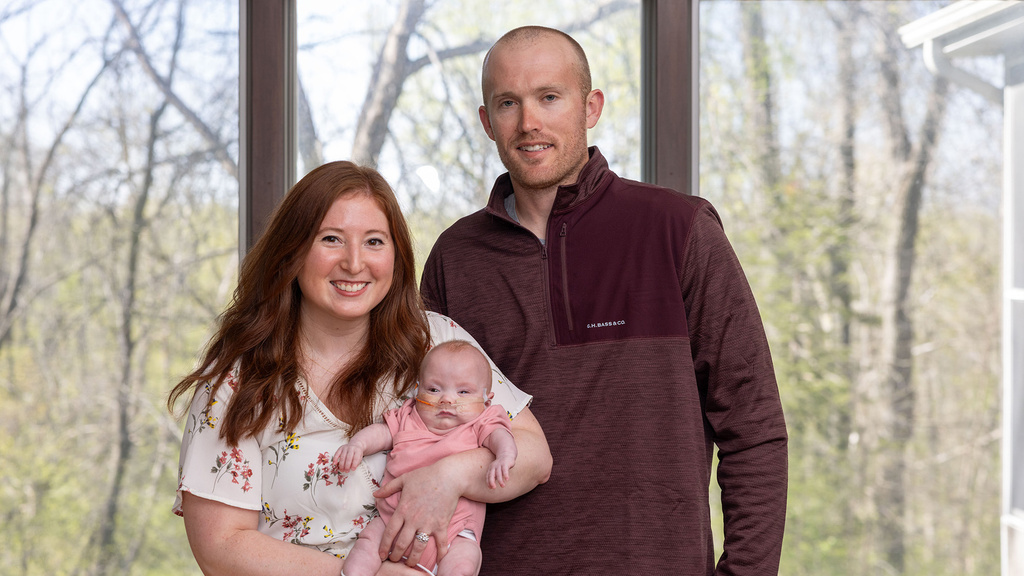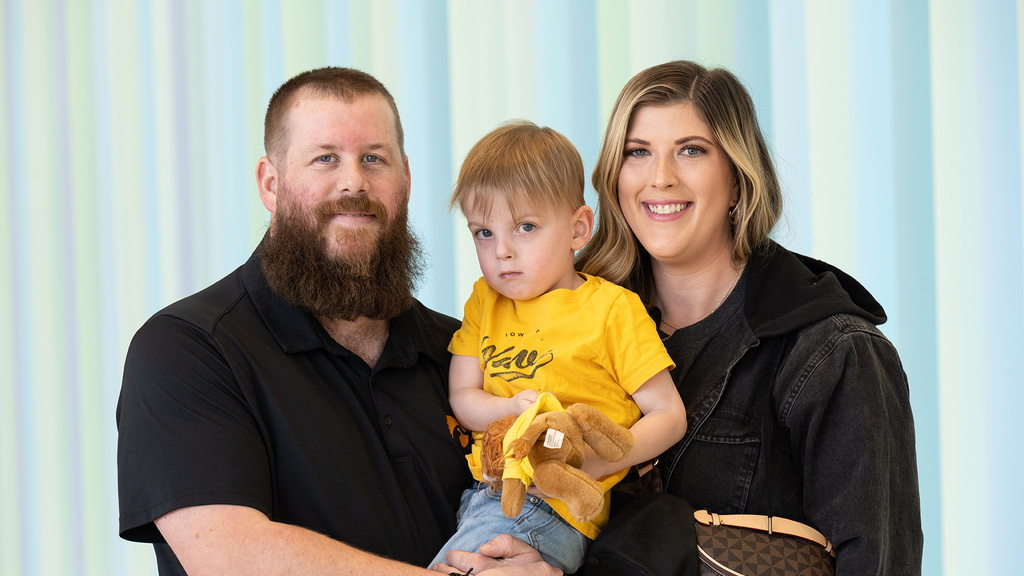When Ivy Gardner of Woden, Iowa, experienced an emergency just shy of 23 weeks into her pregnancy, maternal-fetal medicine specialists at University of Iowa Health Care were able to intercede and save Ivy and her daughter, Ellie Grace, now a happy, healthy toddler.
Story: UI Health Care Marketing and Communications
Photography: Molly Bird—Memories by Molly, and the Gardner family
Published: April 7, 2021
The top photo...
Ivy Gardner holds her youngest daughter, Ellie Grace, on the family farm with her husband, Jason, and their three older children. Just one pound, two ounces when born in 2018, Ellie Grace is now a happy, healthy toddler.
At 22 weeks and six days into her pregnancy, Ivy Gardner, of Woden, Iowa, woke up with horrible abdominal pain. She thought it was the flu, but as her condition worsened, Ivy and her husband, Jason, grew more concerned.
They drove an hour to their local hospital, where an ultrasound revealed a dangerous scenario: Ivy appeared to have a condition called placenta accreta, in which the placenta grows into the wall of the uterus. Her abdomen was filling with fluid, probably from severe internal bleeding.
The emergency physician contacted University of Iowa Health Care Medical Center for help. Andrea Greiner, MD, a high-risk obstetrician and maternal-fetal medicine specialist, advised a blood transfusion and, to help protect the baby’s lungs and brain, a steroid shot for Ivy. Greiner recommended transporting Ivy to Iowa City immediately.
Just after midnight, Greiner and her colleagues performed an emergency cesarean section, saving Ivy and her new baby, Ellie Grace. Just one pound, two ounces at birth, Ellie Grace is now a happy, healthy toddler.
“Dr. Greiner saved my life,” Ivy says. “She’s amazing. Looking back, I realize things could have gone really wrong if I didn’t get to UI Health Care.”
“I had this terrible feeling”
Ivy and Jason were excited to welcome their fourth child. But after a routine 20-week ultrasound showed placenta previa, in which the placenta lies on the lower side of the uterus and covers the cervix, Ivy started to worry.
“I had this terrible feeling—a women’s intuition,” she says.
Still, when she woke up in pain that day in September 2018, she didn’t make the connection right away.
“At first I thought it was a stomach flu,” Ivy says. “I lay on the floor and in bed, sweating, and my shoulders hurt. I felt a sharp pain with every breath and movement.”
The trip to the local emergency room confirmed her earlier fears. Stormy weather that day prevented transport to Iowa City by helicopter, so Ivy was transported by ambulance—a three-hour trip.
Meanwhile, Greiner notified the neonatal intensive care unit (NICU) to be on standby for a premature baby. She called together a team of specialists, including a gynecologic oncologist who specializes in difficult pelvic surgeries, nurses, anesthesiologists, neonatologists, and transfusion medicine experts.
“Ivy’s case was very urgent,” Greiner says. “We suspected the placenta had grown through the wall in her uterus. She was bleeding into her abdomen, putting her life at great risk. If there isn’t enough blood circulating, her heart might stop.”

Ivy Gardner with her newborn daughter, Ellie Grace, at University of Iowa Hospitals & Clinics in September 2018.
“You have this amazing appreciation for being alive after you think you might die. And it’s just because of the great team at UI Health Care that I’m here.”
When Ivy arrived at the hospital, Greiner reviewed her imaging results from the local hospital and performed an ultrasound.
“I saw the fetus with a heartbeat,” Greiner says. “But I also saw placenta previa and changes in the placenta consistent with placenta accreta, the fluid in Ivy’s abdomen, plus a blood clot sitting on the front of her uterus.”
In recent years Greiner and her colleagues have noticed an increase in the number of women with placenta accreta, possibly related to the rise in the number of women having multiple C-sections. Ivy had had three.
“We developed special guidelines for treatment of placenta accreta in the outpatient and hospital settings,” Greiner says. “We planned the details, including what team members should be in place, what labs and bloodwork should be done, and what IVs and medications are needed.”
Making it through the night
Before surgery, Ivy sat in her hospital bed, thinking of her three little ones back home. She planned for the worst, just in case.
“Surprisingly, I didn’t panic or cry,” Ivy says. “I ordered three 4-by-6 portraits to be sent to the house so each of my children would have a picture of me in case I didn’t make it. And I made a little video telling them how much I loved them.”
Greiner and her team performed the emergency C-section, bringing Ellie Grace into the world at 12:40 a.m. and sending her immediately to the NICU. Then they worked to stop Ivy’s internal bleeding.
“At the time of the C-section, typically we deliver the baby and then the placenta comes out as the uterus contracts after delivery,” Greiner says. “However, since Ivy had placenta accreta, that did not happen because the placenta was firmly attached to the muscle wall of the uterus. This is associated with a very high risk of hemorrhage, and the mother can lose blood volume very quickly.”
Maternal-fetal medicine
Maternal-fetal medicine specialists focus on the health of you and your baby if complications arise before, during, or after your pregnancy. Our maternal-fetal medicine experts provide you and your baby with the best outcomes possible by working with a team that can care for all of your needs.
They performed a hysterectomy and removed a softball-sized blood clot.
Ivy woke up later that morning filled with gratitude.
“You have this amazing appreciation for being alive after you think you might die,” Ivy says. “And it’s just because of the great team at UI Health Care that I’m here.”
A little miracle
After spending a few hours in intensive care, Ivy went with Jason to the NICU to see Ellie Grace.
“I was so happy that she was alive,” Ivy says. “I saw her hooked up to all the machines and told Jason, ‘She’s going to be OK. God allowed both of us to be saved. She’ll be fine.’ And she is. She’s amazing.’”
Ellie Grace spent the next five months in the NICU.
“The nurses took excellent care of her,” Ivy says. “They became like family to us. Ellie Grace is so happy now. From time to time, I send the hospital pictures so they can see the little miracle they saved.”



